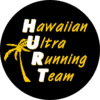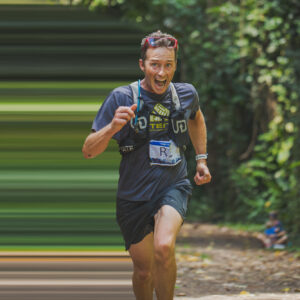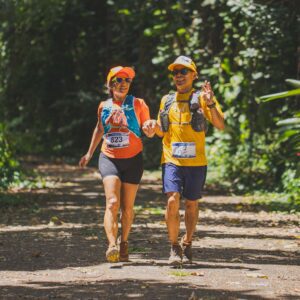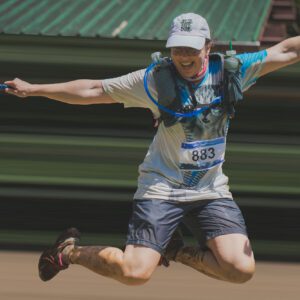Reflections on the Past Weeks
I believe we have seen something remarkable during the last two weeks. Others unfamiliar with the circumstances might just have expected it as matter or course, or feel entitled to critique events with no knowledge of the facts or without making any relevant contribution to aid in ending this tragic situation. But it is something we of this community understand. It is a deep, primal, gut wrenching feeling, a knowledge that a careless mistake, or just a misplaced foot fall, can put us at great risk too. We begin each venture with this knowledge at our side and forget it travels with us at our own peril. It is what makes us different.
What I think is the most remarkable fact of this entire tragedy is that the victim was basically little known to the trail community. He had run a trail series race, had done a few practice hikes and then had gone out that morning to Peacocks. Whatever his past, he was a Hawaii trail newbie in the most basic of ways.
I was not there, but I have been there before and I have gone with newbies, I know what the old crowd says to them. I'm sure that the phrase 'Just stick with us and you will be OK.' in some form or another was uttered. I'm sure there was conversation before the start concerning trail conditions, and how long they would be out and how far they would go. I'm sure water, electrolytes and nutrition were discussed. You stand down at the parking lot and look up and you have to know this is going to be a steep and at times possibly dangerous hike. At the same time, some people take their kids up the Kealia trail. It is a paradoxical experience. We go farther than most, and do it faster, but the rules are the same as with most places in Hawaii, staying on the trail is of paramount importance and personal responsibility is the key component of any hike.
What exactly happened out there is anyone’s guess. But given the outcome it was likely the result of a long series of unfortunately poor decisions. Please understand, I have been in such a situation, I have found myself clinging to the edge of sheer cliff, my guts doing that uneasy tightening as I directly contemplated my own death. It was almost forty years ago but I occasionally wake up at night holding on to that single root while sweating and hoping for a toe hold to become apparent. 'Never go down something you have not been up!' was a hard learned lesson. Having made those bad decisions, having been over the edge, I know what it can be like. I was just incredibly lucky I did not die; and if I had, my body would likely still be out there at the bottom of that narrow deep lost valley on the island of Upolu, Samoa.
Most trail people have had those kinds of experiences, or similar, and it is one of the factors that united us all as we came out to the air field parking lot to join in the search. We could understand; the mistakes, the fear, the ultimate tragedy. So it was that trail runners, trail hikers, dog search teams, fire and rescue crews, hunters, a small group of the lost hikers friends, and others who know and love our 'aina came together to search for a man very few people among us knew.
Ultra runners were the first people to go searching, and then we searched along side the Official Search and Rescue crews. When the Fire Department called off their search after three days we could have stopped. Despite all the hopes and prayers, the outcome was pretty much certain. Three days and nights out on Peacocks is a very long time. No water, no food, no extra clothing, no means of communication; all these factors led to one conclusion. We could have packed up and left when the official search ended and we would not have been criticized by any responsible group or individual.
But we didn't do that. We had made this man 'one of our own' and many of us put our hearts and souls into finding him. Ultra runners organized search teams and covered search areas, we communicated with search and rescue, and coordinated other groups who joined the effort. We talked with friends and family and pieced together the story. We communicated with the press as we became aware of the situation. Ultra runners held the search effort together with a simple belief that we would not leave anyone up on the 'hill'.
There is a lot of cross-over among trail people so Trail and Mountain hikers, pig hunters, dog search teams, were quickly brought into the search effort. These small groups were the only ones really qualified to conduct a search up there. It was dangerous for everyone involved, even though they had a good idea of those dangers. From the first days of the search people were coming down the Kealia to the parking lot shaking their heads and quietly relating scary stories of sudden steep cliffs, loose rocky slopes, mud slick steeps, and a lot of close calls. Combine this with hot humid weather that sucks up fluids and electrolytes and you get quick fatigue, easy situations to get lost, and many opportunities to suffer injury. Just all around nasty stuff. It was the main reason less experienced searchers were discouraged. It put the burden of the search on a very small group of very dedicated people.
But whether an ultra trail runner, an extreme hiker, a pig hunter, or search and rescue, a common understanding of the trails is hardship and quiet suffering. This small ohana just settled in, knew that it wasn't going to be easy and went about the search task with incredible dedication. The fact that the hiker's body was found after seven days is quite amazing. There are lots of others who have been lost in the mountains of these islands who were never found, and not for a lack of searching. The final result was far from a given.
Unless having actually been there and able to see how few people were qualified to search, unless having made the long hike up the the Kealia and looked back down, unless having walked the roads and trails of what is called Peacocks, one can have no real understanding of the immensity and danger of the search. Nor is it possible to get one's mind around the fatigue and emotion that such a small group subjected themselves to over the course of the week. He was one of us, and that was sufficient to face great hardship, risk one's life, miss work, and be away from family. What I find most surprising is that we did not suffer another injury during the search. It speaks a great deal to the strong coordination and levelheadedness that prevailed.
Even in Hawaii, this was the outpouring of Aloha of truly abundant proportions. And I think it speaks a great deal about the courage and fortitude of all those who love and use the mountain 'aina. We can all be quietly proud of how we came through the tremendous challenges of this tragic event.
Yet, now, rather than congratulate ourselves I believe we must all re-examine our own attitudes and practices and ask ourselves if that moment comes when we ourselves may need help, are we prepared, have we been responsible enough to ourselves and to our friends to limit the impact of our own sudden need. It's easy enough now-a-days to be locatable in most places, to be in ready contact with others, to pack sufficient supplies on our own backs to allow for unexpected events and to be trail smart enough to make ourselves readily locatable. It is however hard to accept that we are more vulnerable than our own concept of ourselves allows. At the same time we often can not do everything that can be done, and there are limits to what one humps into the bush. There is no doubt however that we could all be acting in a manner that better ensures our safety and, more importantly, limits the impact of our own potential mistakes on the lives of our friends. Personal Responsibility: perhaps we must each arrive at a new understanding of this concept, in light of recent events. It deserves a great deal of contemplation.
With much aloha, Mikem



